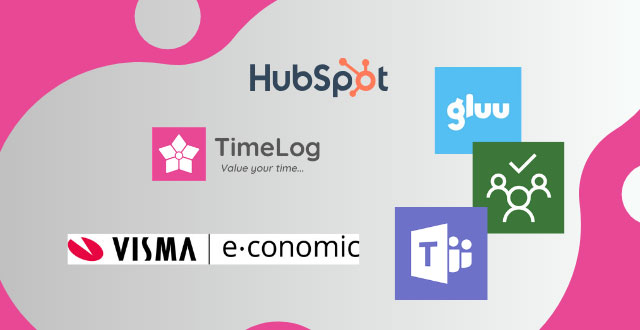How to get well on your way to powerful processes
8 min read
Time tracking
Build your perfect data foundation for spotless invoicing and deep business insights with easy time tracking.
Project management
Be a world champion project manager. Keep your projects on track - and profitable.
Resource management
Efficiently staff projects and run a predictable business with confidence.
Insights & Reporting
Get smarter - faster - to make clever decisions for long-term growth impact.
Project accounting & Invoicing
Invoice everything - fast and accurate - while staying on top of project finances.
Staff & Salary
Give accountants and HR an intelligent tool to eliminate draining administration.
Financial Systems
TimeLog offers standard integrations for all your favourite financial systems. Save time and reduce manual tasks.
Payroll Solutions
TimeLog offers standard integrations for multiple payroll solutions. Get easy salary administration and only enter payroll information once.
Add-ons
Track time automatically via Outlook, use gamification or find another add-on that can support your business.
Multiple Legal Entities
You can create synergy between your departments and across borders and offices with the Multiple Legal Entities module from TimeLog.
Business Intelligence
Utilise the insights you get from TimeLog to the fullest. Our system is ready to integrate with multiple BI solutions.
Partner Integrations
TimeLog PSA is part of a large ecosystem. Get an overview of all the partner integrations in the TimeLog family.
Economy department
Save 1-2 days a month on your invoicing process.
Project teams
From planning to execution and evaluation. Robust tools for every project manager.
Management teams
Create a performance-driven culture with solid reporting capabilities.
Large enterprises
Enhance operations and performance across entities, countries and departments.
NGOs and non-profit organisations
Simplify internal processes, spend less time on administration, and get documentation in place - at a discounted rate.
Blog
Get inspired to run an even better business with articles, guides and analyses.
Guides, podcasts and webinars
Get access to templates, guides and webinars that help and inspire you.
Help Center
Looking for help material and user guides to the TimeLog system? Look no further. Find all the help you need now.
Get a single source of truth
Discover how companies maintain a single source of truth across borders, departments, and currencies.
Get integrated
Discover the advantages customers gain from utilising our integrations and API.
Reporting in real-time
Explore how others leverage reporting to optimise their processes and make informed decisions.
Get started with resource planning
Discover how other companies thoroughly grasp their resources and enhance their ability to predict future trends.
Improved project financials
This is how the efficient financial toolbox from TimeLog helps project managers and CFOs improve their project financials.
Faster invoicing
Discover how other companies have slashed the time spent on invoicing by 75% - and uncover how you can achieve the same efficiency.
The Story of TimeLog
Get insights on TimeLog and how we can help you grow and evolve your business.
Employees
See who shows up every day to deliver the best PSA solution.
Career
What's life like at TimeLog? Are we hiring? Get the answer here.
Partner
Create even more value for your customers, as well as ours, as a TimeLog Partner.
Premium Service
Online Help Center, tailored onboarding and support from Day 1.
Corporate Social Responsibility
We work to ensure a positive impact on planet, people and businesses.
Security and GDPR
Learn more about how we work to keep your data safe and provide maximum security.
3 min read
As a business owner or head of finance, you know how overwhelming it can be to keep up with constantly changing regulations. And the latest change – the new bookkeeping act – is no exception.

Is manual bookkeeping putting a strain on your time and resources? There may be more efficient ways to divide those assets to support your business better.
Don't worry - our guide to the new Bookkeeping Act will help you quickly navigate the complexity of the legislation.
Implementing this new bookkeeping act is expected to improve your efficiency by streamlining the process and freeing up more time for you to focus on other tasks.
The Bookkeeping Act, which became effective on 24 May 2022, is a significant milestone in promoting the digitalization of bookkeeping and streamlining companies' reporting procedures to authorities.
The mandate for digital bookkeeping and digital bookkeeping systems will simplify recording purchases and sales, reconciling accounts with banks, and submitting annual accounts and VAT reports.
A "Business case" by PWC presented a proposal for a new bookkeeping law" published in 2022. It estimates that this initiative will provide Danish companies an annual administrative relief of DKK 2.9 billion, making it the most significant reduction of regulatory burdens ever implemented in Denmark's business community.
With the Bookkeeping Act in place, companies can easily comply with regulations, ensuring greater security for storing their accounting material, particularly in cases where cybercrime may occur.
Please note that the above timetable only concerns the requirements for standard digital accounting systems.
The requirements for customised accounting systems will also only enter into force later. The requirements for these will be prepared in the first half of 2023.
The Danish Business Authority will inform about requirements and dates of entry into force on this page as they become available. They will also update the page with information about deadlines.
The Danish Bookkeeping Act and the Executive Order on requirements set three basic requirements for standard digital bookkeeping systems:
Bookkeeping needs to be organised and carried out considering the complexity of your business, the number of transactions and the economic volume of transactions. This means that, in practice, how each company should keep its accounts can vary greatly.
In your organisation, you must establish and continuously maintain a satisfactory and secure accounting environment. This means, among other things, that you must install the internal controls and procedures necessary to ensure.
The accounting environment's organisation and performance should consider the business's complexity, the number of transactions, and the economic size of the transactions. However, there are also general requirements for the accounting environment that do not depend on the complexity of the organisation, the number of transactions, and the economic size of the transactions. The general requirements are:
Is your company subject to accounting requirements under the Annual Accounts Act? Or has your company's net turnover for two consecutive income years exceeded DKK 300,000? Then, you must prepare a description of your bookkeeping procedure.
The description must be kept together with your accounting material and not sent to the Danish Business Authority or any other authority.

5 min read
 Read more
Read more
 Read more
Read more
 Read more
Read more
 Read more
Read more